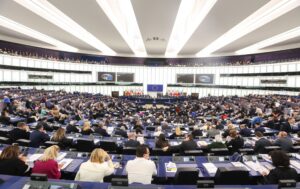The draft for a European Packaging and Packaging Waste Regulation (PPWR) is currently being
discussed and processed in the Council and the EU Parliament. The AGVU recommends the following:
Design for Recycling: Stakeholder participation through a “Packaging Forum” or CEN standardisation
Consistent design requirements are crucial for increasing the recyclability of packaging. Ensuring a
genuine stakeholder voice is necessary for the development of design criteria. A participatory approach
allows ambitious and realistic requirements to be developed through diverse expertise and to be
continuously adapted to technical progress. Stakeholder involvement can be achieved through the
participation of representatives from industry and academia in the development of the delegated acts.
The EU Commission had already considered such institutionalised participation with the proposal of a
“Packaging Forum”. Alternatively, the mandating and timely development of CEN standards for all
packaging materials is an option.
Recycling capacities as a criterion for the recyclability of packaging
From 2035, the classification of the recyclability of packaging will also depend on whether sufficient
recycling capacities are available “on a large scale” throughout the EU for the respective packaging
format. However, manufacturers have only limited influence on the recycling infrastructure.
Fluctuations caused by the failure of individual recycling facilities should therefore not automatically
lead to a marketing ban for the packaging concerned. Instead, an average value of the available
recycling capacity over several years should be considered to meet the requirements.
The quantity placed on the market or the amount of waste generated per packaging format should be
used as a basis for calculation. Using the population as a benchmark for the threshold is problematic
since not all packaging formats are used by the entire population.
A geographical restriction is currently being discussed, i.e. the consideration of the recycling
infrastructure in only one or several EU member states. However, this would create barriers to market
entry and endanger the EU internal market. Moreover, such a restriction would be in contradiction with
the market realities: Sorting and recycling capacities are used across borders and cannot be exclusively
allocated to any one Member State.
Recycled content – calculated on the basis of production volume per year
The Commission had proposed that the recycled content be determined for the plastic content of each
individual unit of packaging. However, it would be much more practicable to base the calculation on
the average of the total quantity of a manufacturer’s products that are within the scope of one of the
quotas under Art. 7. This procedure would also correspond to the implementation of the SUPD in
Germany. The calculation period should be one year. A calculation per production plant, as is currently
being discussed in the Council and the European Parliament, would lead to more bureaucracy without,
however, sustainably increasing the demand for recycled materials. Decentralised producers would be
disadvantaged.
Achieving packaging minimisation with less bureaucracy
Manufacturers are going to be obliged to prove compliance with the packaging minimisation
requirements according to Art. 9 PPWR. The effort to document in a legally secure manner that
packaging cannot be smaller or lighter than it actually is seems disproportionate, especially for SMEs.
Instead of standard documentation of packaging minimisation, the competent authorities could be
authorised to request evidence from companies on a random basis or in case of justified doubts.
Refrain from packaging bans
Bans on certain packaging formats are intervention-intensive measures and also affect consumers. For
their justification, strict requirements must apply. The selection and evaluation criteria of the packaging
to be banned in the PPWR draft, however, are not transparent. There is no scientifically verifiable
reference to ecological advantages resulting from the bans. On the contrary, especially in the case of
fresh fruit and vegetables, packaging bans could have negative effects on food waste, the
environmental footprint and the product price. Against this background, packaging bans should be
completely deleted from the text of the regulation. The minimisation of packaging resources can be
achieved efficiently and at the same time effectively through economic incentives.
Reusability – Creating a methodology for LCA
Both reusable and single-use systems have their justification and should be evaluated according to the
circumstances and the environmental goals to be achieved. Well-designed reuse systems can make an
important contribution to resource and material savings in certain areas. At the same time, deposit and
recycling systems for single-use packaging also have environmental advantages in certain areas. The
PPWR should therefore reflect openness to both systems. The choice between single-use and reusable
should be made based on appropriate ecological assessments, for example, LCA (Life Cycle Assessment)
or PEF (Product Environmental Footprint). The Waste Framework Directive (Art. 4) already provides
that deviations from the waste hierarchy can be justified by life cycle thinking. This should apply
accordingly in the PPWR. The PPWR must provide the path for the development of an appropriate
methodology and be consistent with existing standards.
No forced reusability for transport packaging
The proposed reusability targets for transport packaging are hardly achievable in practice and are not
convincing from an environmental perspective. For example, a target of 100% is to be achieved only
one year after the regulation enters into force (Art. 26, Para. 12). Even if postponed by a few years, as
is currently discussed, these targets would trigger enormous changes in business processes at very high
cost. Above all, the long-established and successful closed-loop recycling of most transport packaging
would be thrown overboard: Transport packaging is regarded in the industry as a valuable raw material
that is recycled and reused across the board. Moreover, a switch to reusable packaging would require
a register and entail bureaucracy and administrative work.
The distinction between cross-border transport and transport within a member state cannot be a
criterion for the obligation to use reusable systems. It would be contrary to the principles of the EU
internal market and would disadvantage companies located in larger member states.
Specific requirements for transport packaging in the industrial or large commercial sector must be
observed. Particularly in the area of dangerous goods, a 1:1 transfer of the PPWR regulations geared
to consumer goods is not feasible. Furthermore, the list of examples for transport packaging should be
dispensed with: Some of the packaging mentioned cannot be classified as transport packaging because
they have direct contact with the contents, including pails, drums and canisters.
Refill stations are the responsibility of the retail sector
The Environment Committee in the European Parliament is considering making it compulsory for large
retailers to dedicate at least 20% of space to refill stations. Of course, refill stations can be a useful part
of reusable systems, but they must be adapted to the needs of the customers. However, only a limited
number of products are suitable for unpackaged dispensing. There are also unresolved challenges in
terms of labelling, hygiene and consumer safety. A more flexible approach that allows retailers to
choose the extent to which they introduce refill stations is therefore preferable.
EPR- fee modulation compatible with EPR systems in the member states
With the PPWR, the modulation of EPR fees according to ecological criteria becomes mandatory. The
degree of recyclability of packaging should be a uniform criterion throughout Europe. On the other
hand, the integration of recycled content is already ensured by the Article 7 targets and should not be
a further criterion.
The legal framework of the PPWR will also form the basis for the intended further development of §
21 of the Packaging Act, which regulates EPR fee modulation in Germany. A financial fund currently
under discussion, which is fed from fee surcharges by measure of ecological criteria, should be set up
under private law. This is in line with the idea of product responsibility and can be efficiently
implemented by commissioning the waste management systems to collect the fee surcharges.
The position is available for download here.




